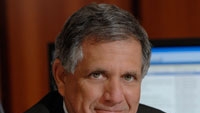Entertainment executives remain cautious as Wall Street melts down

Caution and confusion reigned last week among entertainment industry executives as Wall Street continued its meltdown and the implications of the financial crisis spread throughout the world. Media stocks were topsy-turvy, as the industry wondered how big the hit would be on advertising budgets.
It’s expected that the financial crisis will further sink advertising for financial services — a sector that had already cut its advertising. For 2007, Nielsen Monitor-Plus reported that financial and investment services advertising amounted to $1.8 billion. That’s up almost 15 percent from 2006.
For local TV stations, financial services ranked as the ninth-largest advertiser during the first half of 2008, according to the Television Bureau of Advertising. The segment’s spending on TV station ads was down 4.4 percent over the prior year to about $245 million. The figure is in line with the 3.8 percent overall decline in local broadcast ad revenue.
In an irony of timing, several major media moguls gathered last week in a midtown hotel in New York City for a two-day financial conference sponsored by Goldman Sachs, one of the few Wall Street companies still standing. The meltdown headed the discussions.
CEOs from CBS, Time Warner, News Corp., Liberty, IAC, Marvel and Comcast attended the conference. There was a consensus that the hardest hit by the current financial meltdown are local TV stations and newspapers.
CBS chief Leslie Moonves, while acting as a cheerleader for broadcast television, acknowledged that the broadcast business is in a state of serious flux as online consumption increases dramatically. He forecast $650 million for his company in interactive revenue this year. “We’re in a state of transition,” Moonves said, “but having said that, I like being in the network business, with its big-tent properties.”
News Corp. chief executive Rupert Murdoch told the conference that his company is making healthy gains in its cable-network and international operations, but FOX-owned TV stations are forecast to experience a 15 percent drop in revenue for the current fiscal year.
Get the TV Tech Newsletter
The professional video industry's #1 source for news, trends and product and tech information. Sign up below.
“Local TV [advertising] in this country is bad,” Murdoch said. “There’s no point trying to hide it.”
Murdoch blamed a 40 percent drop in spending in the automotive category as a key problem for local television stations. On the network level, however, he said advertising is holding up well, noting that FOX had almost no cancellations of upfront advertising.
News Corp., he said, will now focus on new digital media and emerging international countries and avoid traditional U.S. media supported by consumer advertising. In his company’s case, strong cable networks, Web assets and international reach can balance things out.
Murdoch said he’s mainly looking to add small pieces to his global empire, and will focus on assets with subscription models, versus advertising. “Hard times are good for big companies, if you think of the long term at all,” he said.
